Spider-view: "Death Toy"
Cardiac's second appearance is better constructed than his first, even if it is adorned with some 90s excess
—by Nathan on October 6, 2023—
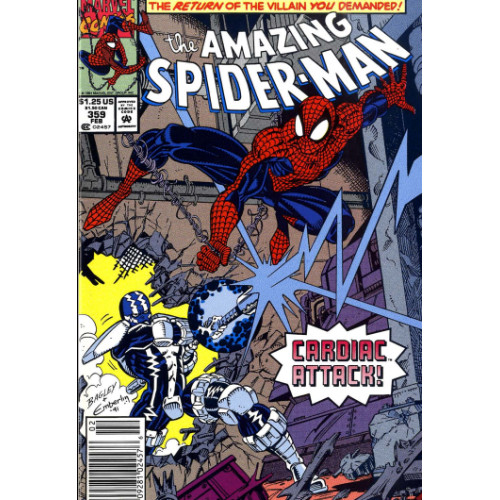
Near the end of this two-part tale (spoilers, I suppose), Spidey, fighting an armored security force alongside vigilante Cardiac, tells the medically-motivated vigilante, "Welcome to Team Spidey!" Team Spidey's a very, very unofficial group, mentioned as an aside, but the truth is, "Team Spidey," as I’ve noted, could have totally been a thing. Thanks to David Michelinie and other writers, like Gerry Conway and Erik Larsen, Spidey’s been traipsing along with some seriously powerful friends lately. Whether it’s battling terrorists alongside Silver Sable, fending off the Sinister Six with a whole host of super-friends, or taking down more terrorists with several sentinels of the streets, Spidey’s been maxing out his social quota lately.
The "team-up" nature of the last several books may not have been necessarily intentional, at least not narratively. There may have been some financial incentive–why not use Spidey to drum up interest in the New Warrior known as Nova or offer Black Panther some high profile exposure? But, for story reasons, it just seems better to have a more social Spidey than a lonely Spidey.
Which brings us to today’s tale, with the return of a strange ally who, at first glance, appears more foe than friend.
"Death Toy"
Writer: David Michelinie
Penciler: Chris Marrinan
Inker: Keith Williams
Colorist: Bob Sharen
Letterer: Rick Parker
Issues: Amazing Spider-Man #359-360
Publication Dates: February-March 1992
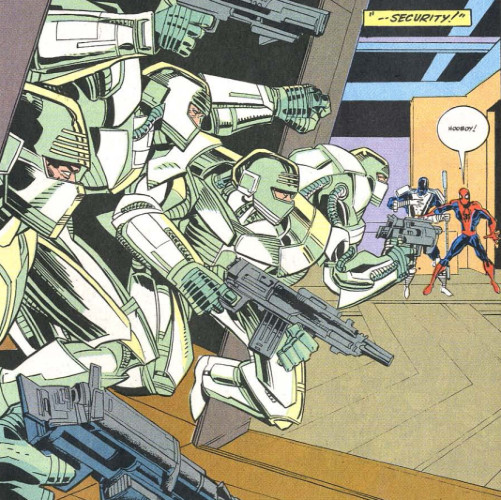
Cardiac’s back, Jack.
When I reviewed Cardiac’s first appearance, I noted how refreshing it was to give Spidey a foil who didn’t bring the typical "kill criminals vs. don’t kill criminals" argument that Spidey and the Punisher (and Wolverine…and Solo…) were perpetually locked into whenever they encountered each other. Cardiac’s stance is more focused on bringing criminals to justice instead of murdering them in cold blood, similar to Spidey (it may help that Cardiac’s secret identity is Doctor Elias Wirtham, a medical professional). What irked me was Spidey’s insistence on bringing Cardiac to justice, taking the dude down before he could do further damage, even working with an allegedly crooked pharmaceutical CEO to try and stop Cardiac. The issues lacked any middle ground or any chance at reconciliation.
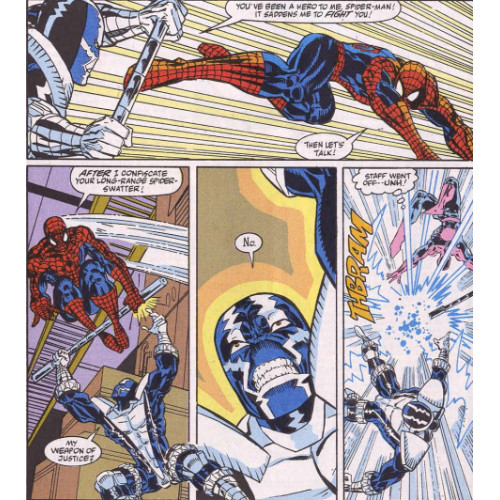
Perhaps this is why this two-parter’s first issue proclaims Cardiac as a "villain" (and not just any villain but "the villain you demanded!" noting the readership’s interest in the character). He’s a bad dude doing (what he believes) to be the right thing, taking justice into his own hands. Why this makes him a bad guy when Frank Castle, though rightfully called a murderer, is still treated as a vigilante, I don’t know. Maybe it’s to highlight the fact that Spidey never tries to deliver Frank to the cops, but why the Punisher gets a pass when Cardiac deserves a beat down is anyone’s guess. Contrast this with the Spidey who once struggled to capture a career criminal just because he was an old man who reminded Peter of Uncle Ben, and we’ve got a very conflicted superhero from the pen of Michelinie.
But that internal turmoil is cast aside for a different kind, tension which Michelinie plays with to greater extent and affects Peter Parker as much as it impacts his wall-crawling alter ego.
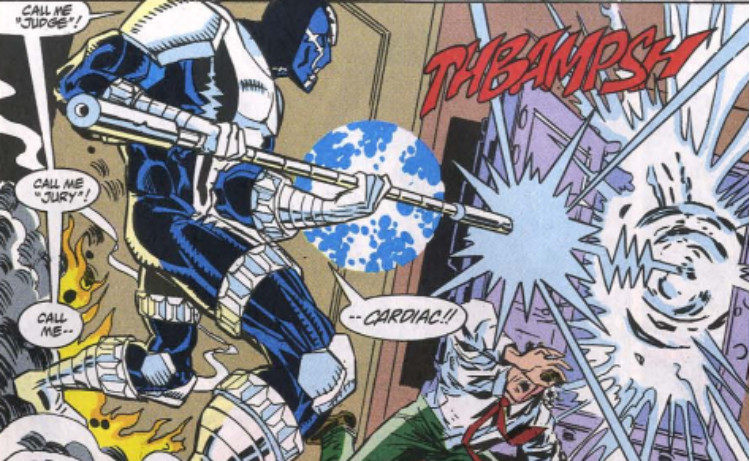
When Cardiac begins targeting corrupt businessmen the Daily Bugle has been reporting on, Peter, Ben Urich, and JJJ realize their stories have been guiding Cardiac’s rampage–through exposing these suit-clad crooks, the newspaper paints targets on these men’s backs. And though Cardiac’s intentions aren’t murderous, the damage and harm he causes in taking these men down creates guilt in Peter. He’s essentially leading this guy on his not-so-wild goose chase.
Peter’s torn, caught between his responsibilities to the Bugle and contributing to stories which make an impact…and the consequences of that impact through Cardiac’s tumultuous actions. Peter's conflicted spirit is treated as thoroughly as Michelinie can handle it over two issues, with Peter discussing the problem with MJ and making a definitive decision one way or the other by time the story concludes.
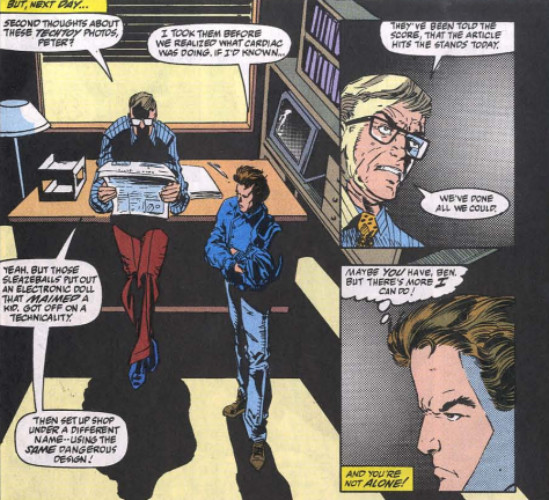
There’s a genuineness here to Peter’s struggle which feels lacking in some of Michelinie’s other "social justice"-driven narratives. This isn’t Spidey and the Punisher discovering the government is behind a plan to institute a cocaine-based economy. This isn’t Spidey and Nova thumping a group of doomsday preppers guarded by a three-headed Sentinel once brought to life by Loki. This isn’t even Doctor Octopus using a rocket to make addicts adverse to cocaine usage so he can sell them the cure for profit. All those ideas are just downright outlandish, rooted in some systemic social issue–drugs, the threat of nuclear holocaust–but hijacked and stripped of their seriousness (but what else can we say? It was the 90s). Here, Peter feels the weight of his actions and genuinely grapples with the ramifications, wondering how best to proceed.
It should be noted Michelinie can’t wholly keep himself from being ostentatious–when they do eventually team up, Spidey and Cardiac battle that armored security force I mentioned in the intro. Earlier, Spidey fights "airborne security drones" sicced on him by some criminals who evade capture. Cardiac’s own costume makes him look like a hockey player equipped for combat–padded shoulders, padded knees, and a long stick he uses to hit things when he’s not punching people. It’s all very loud and convoluted, scenes of high-octane action tethered together by more personal sequences. You may feel invigorated by the action, but Michelinie at least possesses the wherewithal to craft Peter Parker moments in between all the raucous rambunctiousness.
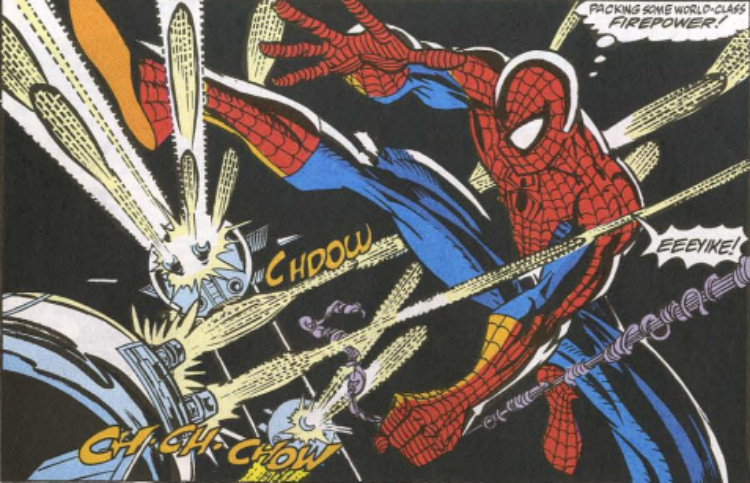
None of the action feels awkwardly placed, of course–each scene feels warranted and purposeful, whether it’s Cardiac and Spidey fighting for their lives or Spidey deciding how best to save Cardiac’s life while aiding a civilian in danger. What does feel ham-fisted is Cardiac’s origin, slapped into the middle of a scene as a mass of exposition reminiscent of when Michelinie had Iron Man randomly ramble about his origin while flying across the ocean in the first chapter of "Demon in a Bottle". Guess Michelinie likes his chit-chatty crusaders, because Cardiac lays it on heavy while Spidey and a corrupt businessman just…stand there and listen? Twiddle their thumbs? Start going "Uh-huh" and "Sure, sure" to encourage the guy to speed up a little? The white collar crook even refers to the pair as "long-winded morons" right when his security force bursts in, but even this bit of self-aware commentary can’t balance how awkward the scene becomes.
Michelinie had nicely hinted at Cardiac’s origin in his first appearance, offering a smidgen of backstory which, I wish, had been teased and elaborated on a tad longer. I’m not asking for some long-running mystery like the secret identity of the Green Goblin–we are, very quickly, acquainted with Cardiac’s alter ego after his introduction–but to offer a small peek previously and then to suddenly pelt us with expositional hailstones leaves me blindsided. Even if Michelinie had waited until the end of the scene or found a more appropriate moment for Cardiac to share his origin with Spidey, I would be more forgiving.
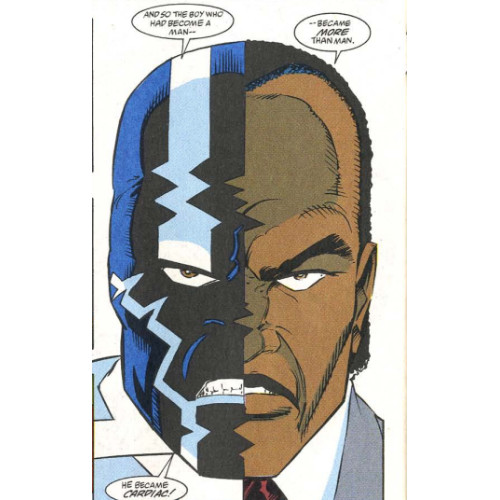
Mark Bagley sits out these issues, replaced temporarily by Chris Marrinan. Though I’m unfamiliar with Marrinan’s other comic contributions, he approaches Spidey with a particular grace and litheness that emphasizes Spidey’s movement when he swings or dodges enemy fire. He works well in larger "freeze frame" moments, like when Spidey saves a security guard or the security force bursts in on Cardiac and Spidey, moments where you just pause and linger on the action. He intersperses these moments with more conventionally laid-out pages, but the panels where Marrinan can hone in on the action of a single second stand out.
After a string of issues fumbling their comments on society at large, we fortunately finally find a narrative that successfully injects some more nuanced notions. I’m reminded of Michelinie’s "Vibranium Vendetta," which found its stride when it could showcase a message through an important character, allowing that individual to serve as Michelinie’s mouthpiece without becoming overly preachy or obnoxious. The writer can’t quite pull himself from 90s excess, but even still, Cardiac’s second appearance is more fulfilling than his first…not quite what the vigilante doctor ordered but close enough.